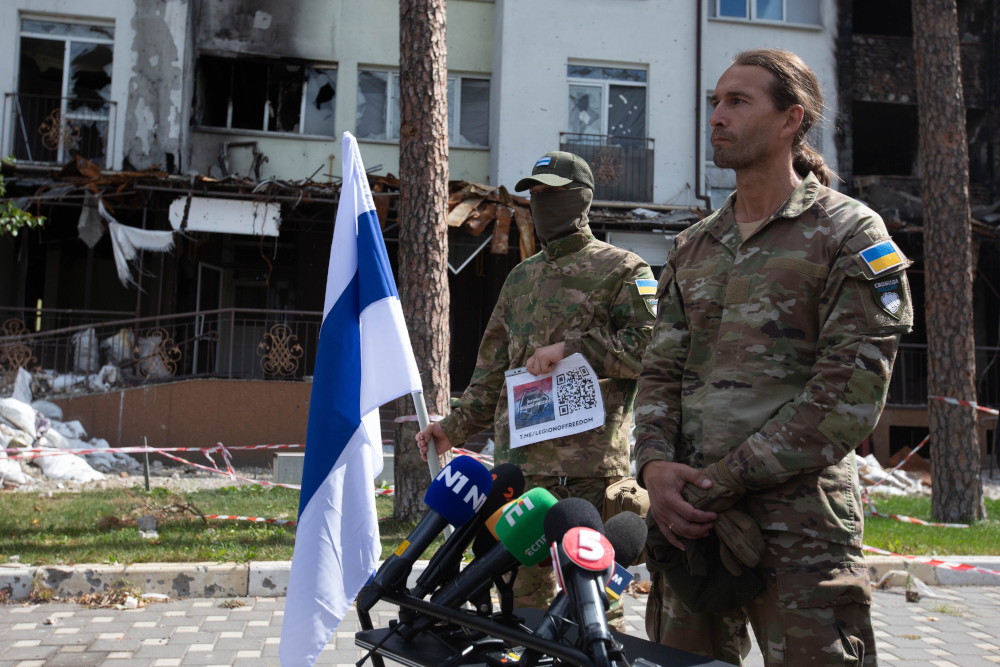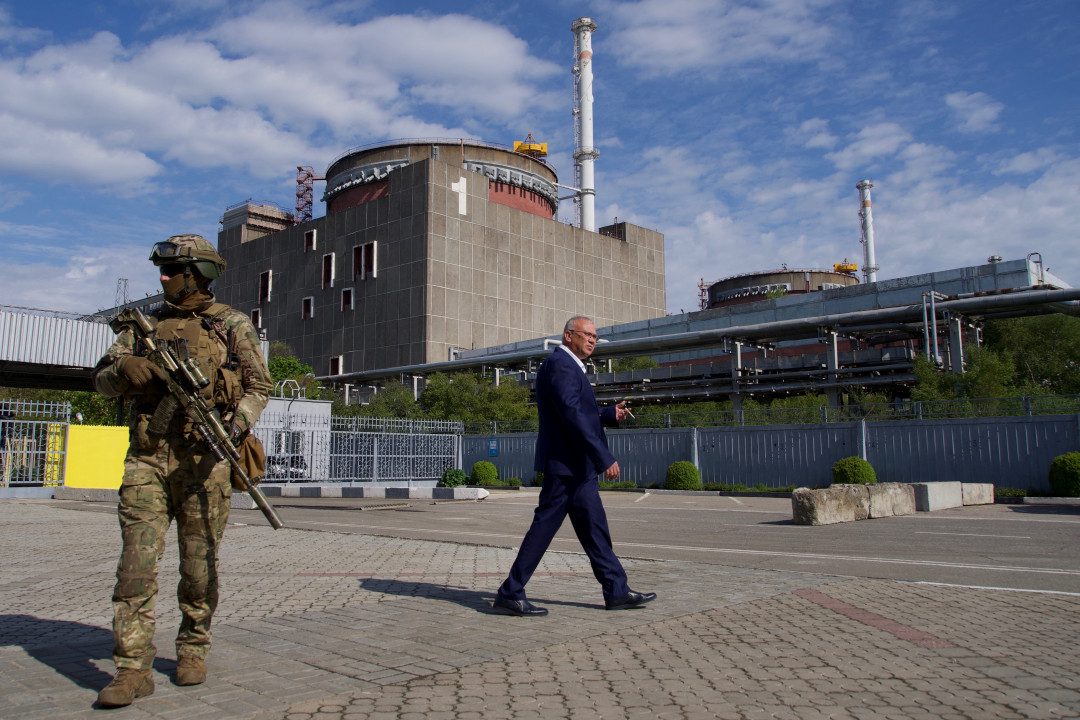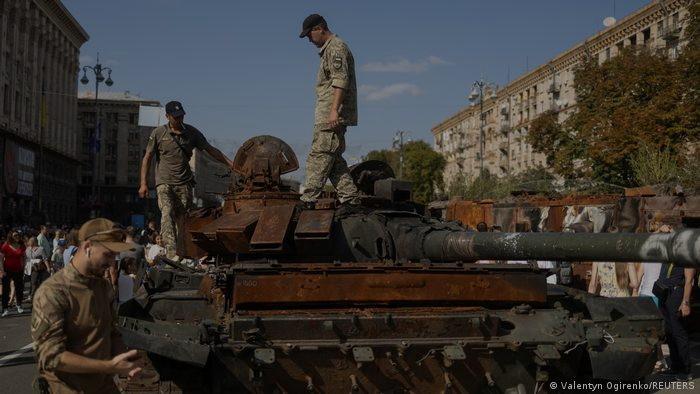Ukraine Daily
Thursday, September 1
Want to get the news faster? Follow our website: kyivindependent.com.
Russia’s war against Ukraine

IRPIN, UKRAINE - 2022/08/31: Soldiers of the Russian Legion “Freedom of Russia” speak to reporters before signing a declaration on cooperation and coordination of actions between Russian volunteer units that are fighting on the side of Ukraine against the Russian army in Irpin. (Photo by Oleksii Chumachenko/SOPA Images/LightRocket via Getty Images)
The Kyiv Independent became the official partner of IT Arena, one of Eastern Europe’s largest professional tech conferences, set to bring together Ukrainian and international tech experts for a live event.
Zelensky publicly thanks informants in Crimea. In his evening address, the Ukrainian president spoke of his meeting with the Commander-in-Chief and other security officials, where special mention was given to those in Ukraine’s occupied southern peninsula that have passed on important information to the Armed Forces. “Our reconnaissance is grateful for this information and is making maximum use of it,” President Volodymyr Zelensky said. “Let the enemy know whose peninsula they are on, temporarily that is.”
Russian independent media: Russia likely to face acute shortage of weapons by end of 2022. According to The Insider, there are already very few guided missiles, while shells for artillery and armored vehicles will be exhausted by the end of the year if the intensity of the war is maintained at the current level. The media also reported that the state of Russian military aviation does not allow for a full-scale air campaign. Russia has used at least 7 million shells since Feb. 24, according to the publication.
German media: 2 employees of German Ministry of Economy suspected of working for Russia. According to the German newspaper Die Zeit, two senior officials from the Ministry of Economy in charge of energy supply are being targeted by German investigators.
Kharkiv hit with S-300 rockets. At least two strikes on administrative buildings were reported by Volodymyr Tymoshko, Kharkiv police chief, during a televised speech. The S-300, a Soviet-era air defense system, is increasingly being used by Russia as a highly inaccurate missile to hit land targets, pointing to further evidence of the Kremlin’s shortage of missile stocks.
Naftogaz succeeds in postponing most Eurobond payments until 2026. According to the Ukrainian state energy company, 77% of investors agreed to delay €600 million of loans for two years after the original 2024 deadline, The remaining €90 million will be repaid by 2024.
Security Service identifies 3 more Russian soldiers accused of war crimes. Lieutenant Colonel Andriy Marushkin is suspected of giving orders to shell civilian areas in the Kyiv and Chernihiv oblasts during the Russian occupation in March, while conscripts Oleksiy Tokmakov and Oleksiy Kroshkin were both allegedly involved in the shooting of a civilian.
CNN: US conducted ‘war games’ with Kyiv before Kherson counteroffensive. The U.S. suggested keeping the offensive limited in geography to avoid overextension along the extensive front line, CNN reported citing multiple U.S., Ukrainian, and Western officials. To achieve better results, Ukrainian forces engaged in analytical exercises that were intended to better understand what force levels Ukraine would need to muster to be successful in different scenarios. Initially, Ukraine planned for a larger assault but decided to focus only on the southern front for the time being.
SBU: Oligarch Medvedchuk, ex-Putin advisor Surkov implicated in Russian coup plot. According to the Security Service of Ukraine (SBU), two unnamed individuals were charged with preparing a coup d’état in 2019 in close cooperation with Kremlin-linked oligarch Viktor Medvedchuk, his Civic Choice organization, and Vladislav Surkov, then Russian presidential advisor.
Survey: Only 7% of Ukrainian refugees do not plan to come back from abroad. Conducted by the Razumkov Center, the study polled 511 refugees dispatched in 30 countries and showed that 36% of respondents expressed their intention to return after being convinced it is safe to stay in the area where they lived. 35% said they would come back immediately after the end of the war and 13% after a year or a few years after the end of the war.

Russian proxy in Energodar Andrey Shevtchik (C) walks past the Moscow-held Zaporizhzhia Nuclear Power Station in Energodar, Zaporizhzhia Oblast, on May 1, 2022. (Photo by ANDREY Borodulin/AFP via Getty Images)
Zaporizhzhia Nuclear Power Plant
As the war enters a new phase, the Kremlin’s troops continue their onslaught in the eastern Donetsk Oblast, while signs of hope appear at the Zaporizhzhia Nuclear Power Plant, occupied by Russia since early March and used by Russian troops to shell Ukrainian-held territories.
Early on Aug. 31, a delegation of 14 experts from the International Atomic Energy Agency (IAEA) headed to the Russian-held nuclear plant, embarking on one of the most complicated missions in its history. But on its way to the Zaporizhzhia plant, Moscow’s forces refused to issue special passes to let the nuclear inspectors through its occupied territories at a checkpoint.
Earlier, Russian proxies said that as of Sept. 1, the plant would go under the control of Russia’s Rosatom, and Ukrainian specialists must prepare for “work under new rules.” Apart from the occupiers’ attempt to destroy as many infrastructure facilities as possible and weaken Ukraine economically, the situation around the power plant has another purpose: to prevent a “blackout” in Crimea.
Before the peninsula’s annexation in 2014, Crimea had an electricity shortage and received it from other regions of Ukraine. Immediately after the seizure of the peninsula, Ukraine did not stop supplying it. The last kilowatts of Ukrainian electricity reached the annexed peninsula on December 30, 2015, followed by a complete energy blockade.
It is difficult to disconnect the Zaporizhzhia plant from the Ukrainian energy system and supply power to Crimea and Russia. Still, it is possible, and Russia has reportedly already started implementing this plan. The president of Energoatom, Ukraine’s state nuclear company, said in early August that Russian engineers had already drawn up a blueprint for a switch in case fighting severs remaining power connections with Ukraine. According to Energoatom, this plan was already presented to workers at the plant. The precondition for this plan was heavy damage to all lines connecting the Zaporizhzhia plant to the Ukrainian system.
The plant’s electricity connections are already in a critical situation, Energoatom’s President Petro Kotin told the Guardian, with three of the four main lines connecting it to Ukraine’s grid broken during the war and two of the three backup lines connecting it to a conventional power plant also down, he said.
The details of the IAEA’s expected visit to the Zaporizhzhia plant on Sept. 1 are unclear, including how quickly Russian forces will allow them to pass through checkpoints in their occupied territory and how long the inspectors plan to be at the industrial site. The plant, still operated by Ukrainian engineers living in the occupied town of Enerhodar, is in the middle of an active battlefield where frequent shelling has heightened fears of a nuclear catastrophe. Learn more about this and other Ukraine war updates here.
Read our exclusives here
As Ukraine’s culture continues to be under the Russian threat, many Ukrainian Americans have again come to rely on Ukrainian cultural groups and practices to demonstrate resilience. They also use these opportunities to collect much-needed money for aid to Ukraine. Read our story on how diaspora continues to preserve Ukrainian culture abroad.
The human cost of Russia’s war
Governor: Cluster munition kills 17-year-old in Dnipropetrovsk Oblast. The teenager died after touching the unexploded cluster shell, which detonated, according to Dnipropetrovsk Oblast Governor Valentyn Reznichenko. Seven other people have died due to unexploded devices in the region since Feb. 24, the official reported.
Russian shelling kills woman in Bakhmut. The State Emergency Service reported that it had retrieved her body from under the rubble after Russian shelling destroyed a residential building on the morning of Aug. 31 in the frontline city of Bakhmut, Donetsk Oblast.
International response
Estonian FM: We will aim to stop most Russians from entering the country within weeks. Speaking to Reuters after meeting EU counterparts in Prague, Foreign Minister Urmans Reinsalu noted that “it takes some time, but I think timing is also critical, looking at these vast numbers of Russian citizens entering.” The remarks come as EU foreign ministers agreed to complicate the procedure for Russians to enter, though stopping short of a full visa ban.
White House: US preparing more military aid for Ukraine. The new package of US security assistance should come in the next few days, national security spokesperson John Kirby said at a White House briefing. “We committed more than $13 billion of security assistance to the Ukrainian Armed Forces, and we will continue to do that,” Kirby said.
Ukraine to receive new delivery of artillery rounds from Sweden. The seventh package of Swedish military aid to Ukraine worth $47 million was announced by Defense Minister Oleksii Reznikov on Twitter.
Baerbock: Public opinion won’t make Germany lift sanctions. Speaking at the Forum 2000 conference in Prague, German Foreign Minister Annalena Baerbock assured Ukraine that Berlin would not lift sanctions even if protests against rising energy prices heat up. “We support you and will support you as long as it takes, no matter what the German electorate thinks,” Baerbock said.
Polish PM: EU should be ready to accept Ukraine ‘in a few years.’ Zbigniew Rau made the remarks at the Forum 2000 conference in Prague. Ukraine has “done everything to earn the title of the country most devoted to European values,” Rau added.
Want to get the news faster? Follow our website: kyivindependent.com.
Today’s Ukraine Daily was brought to you by Olga Rudenko, Thaisa Semenova, Toma Istomina, Alexander Query, Oleksiy Sorokin, Francis Farrell, Brad LaFoy, Asami Terajima, Olena Goncharova, and Sergiy Slipchenko.
If you’re enjoying this newsletter, consider becoming our patron on Patreon or donating via GoFundMe. Start supporting independent journalism today.



Comments
No comments yet. Be the first to react!